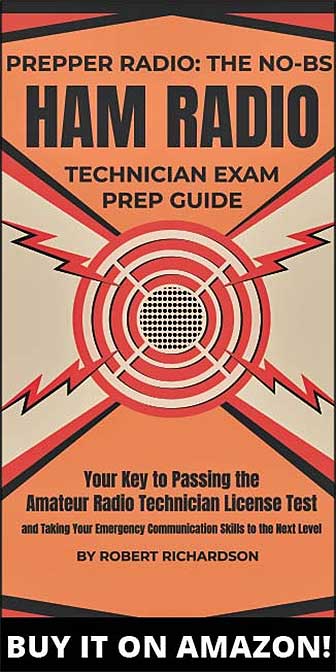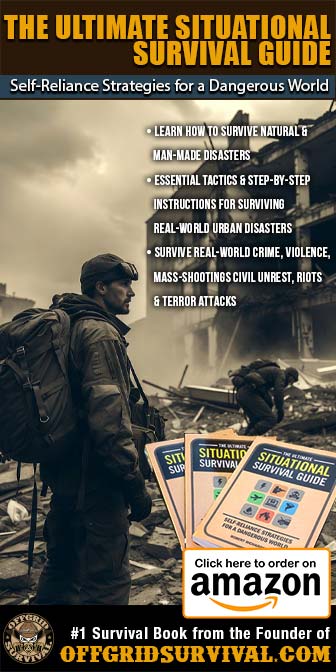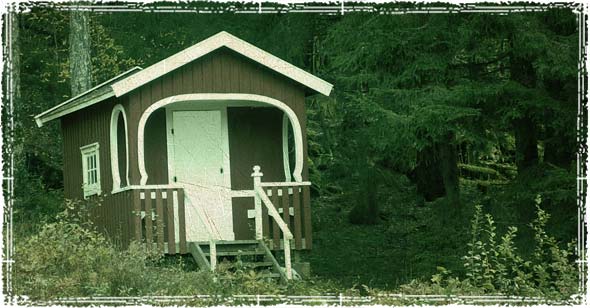Having an emergency evacuation plan is a crucial step in being prepared. In my opinion, it’s one of the most important elements in any survival plan. But I know, I can hear it now…. A number of people are probably getting ready to comment on how they’ll never leave their home, how bugging out is not plan, and how they’ll defend their home to the death in any situation.

That’s Great Skippy!
Listen, just like most people I would much rather be in the safety and security of my own home. But to ignore the fact that an evacuation may someday be inevitable is not only shortsighted; I think it’s a major hole in any survival plan. To truly be prepared, you must consider the possibility of having to evacuate your location.
While I would much rather stay in my home, there are so many different scenarios that could make that impossible, I feel it’s irresponsible not to plan for the possibility. If the SHTF, having a plan of action is going to put you 20 steps ahead of the mindless morons who spent their time watching T.V. thinking nothing bad could ever happen to them.
Government Issued Evacuations:
If you waited for the government to issue an evacuation notice, it’s probably too late. The last thing you want in any emergency situation is to get caught up in the chaos of the crowd. Mindless morons will be everywhere; it will literally be like the zombie apocalypse that so many survival websites like to talk about.

Think about how crazy people act during the holidays. If people can’t even manage to go shopping on Black Friday without trampling each other in the doorway of a Walmart, what do you thinks going to happen if the government issues an evacuation notice?
In a report from the Mineta Transportation Institute, the agency found that every one of our major cities was negligently prepared to handle any type of evacuation, especially ones that hit with no notice.
“Spontaneous evacuations of New York City and Washington, D.C. following the 9/11 terrorist attacks demonstrated that U.S. cities are not prepared to manage the sudden influx of traffic into roads and highways following a no-notice disaster,” said Dr. Anurag Pande, one of the study’s authors. “For many years, anticipated events such as hurricanes have been the basis for evacuation planning. Now we see increasing interest in evacuation planning based on hypothetical no-notice events.”
While this really shouldn’t be a shocker to anyone who is a regular at this site, I include it as a wakeup call for those who have not formulated an adequate evacuation plan.
Emergency Evacuation Planning:
Your personal strategy for dealing with disasters and threats will depend largely on your situation. While every evacuation plan should be custom tailored to your unique situation, your location and your most likely threats; there are a couple of things that everyone should keep in mind.
The decision to “Get the Hell out of Dodge.”
 This one thing is probably the most crucial part of your plan. Deciding when to go should be an important part of your planning process and needs to be thought of now, not when you’re in the middle of a full-blown crisis situation. The trick is to weigh what factors and threats will determine when and if you should leave your location.
This one thing is probably the most crucial part of your plan. Deciding when to go should be an important part of your planning process and needs to be thought of now, not when you’re in the middle of a full-blown crisis situation. The trick is to weigh what factors and threats will determine when and if you should leave your location.
In any evacuation, timing is everything. You must be able to recognize the signs of an impending disaster, and then have a plan in place to deal with it. Do you have a plan?
Evacuation Routes
Keep in mind the quote from above…. “U.S. cities are not prepared to manage the sudden influx of traffic into roads and highways following a no-notice disaster.”
During even a small-scale disaster, in a very short amount of time most of the major highways systems and roads are going to become completely clogged. You need to develop an evacuation plan that includes multiple routes out of town.
Plan now, and map out as many routes as possible. Google Maps, A Road Atlas, and Off-road Recreation Maps are all resources that can be used to find alternative evacuation routes. Have a plan A – Z and don’t forget to print out vehicle, off-road and walking routes (hiking trails, railroad tracks, side roads, etc…)
Are you actually prepared to Bug Out?
Many preppers talk about bugging out, but how many of them have the skills or the strength to actually do it? What if the situation were to call for an evacuation by foot?
It’s one thing to talk about bugging out; it’s another thing to carry your gear 10-15 miles a day in dangerous and unforgiving conditions. Check out our article on preparing yourself for a bugout scenario.
Customize your Strategy
The key to being prepared is to customize your strategy. No book, No website, and No expert will ever know your unique situation enough to tell you what to do. Each and every person reading this must evaluate their own specific circumstances and then formulate a plan to deal with the most likely threats facing them.
While we can point you in the right direction, your safety ultimately comes down to how willing you are to put in the work. I encourage you not to put off implementing these strategies. The last thing you want to find out in a disaster is that you are too late to do anything about it.







Great article! I’ve often thought the same when it comes to black friday and how any disaster would affect people. Wal mart would be chaos! One good reason to stock up now. I’d like to see what you recommend for bug-out supplies, foods, water purification systems, knives or tools, and maybe reviews on tents and sleeping bags, boots and clothes. Maybe you could chime in concerning firearms, and what will best benefit folks in these types of scenarios. Finally, do you guys have a youtube channel?
It is a good article and gets the old brain working. But, I was one of those people who’s job was to set up evacuation routes, etc and every disaster plan I’ve ever seen has routes in it. But consider this: a scenerio like in One Second After where the towns, cities, counties actively block refugee traffic or , at least screen it. No town or county wants to deal with refugees; they consume supplies and cause problems. Though a person might have to “bug out” , never forget the possibility of denial of access on certain routes as well as access to some cities and towns along the route. No one wants refugees.
One Second After is an amazing book.
Gear is only part of the answer. Training, skills, and practice all play major roles. Having the best gear isn’t going to do you any good if you don’t know how to use it.
One of my hobbies is geocaching. We have some great trails, both for vehicles (4×4, snowmobiles, atv’s) and by foot (or skis, even a few bike trails). The area has some nice scenic places dotted with geocaches. Doing some of the longer trails give you an idea of what you can expect on foot. I did about 8 miles last week on my day off, searching for caches in a state forest on both the foot trail and ski trails. I had a lightened pack on me, but still enough to test my skill. There are also many truck trails, old land management fire trails, logging trails, and others that my 4×4 will clear through if need be. A bicycle would be impractical out here for the most part. You would be better off on foot, if the roads came to be that bad. I also know most of the back roads from work to home, the ski and snowmobile trails, and logging roads. Leaving work in a panic situation would be more difficult, as it is highly populated at times, compared to being at home. But it is a tourist town, so only the locals will be using the alternate routes out. As always, tanks on all vehicles are full.
I can relate to folks who live in the city,this is a very important consideration.My husband and I have been blessed that we are 60 mi. from the nearest large city and 25 mi. from the nearest interstate or smaller city.
We have animals that can’t handle bugging out,my husband of 78,heart bypass patient,isn’t walking to far and where would we go.
We have our gens,rv propane frig,water out the wazoo,ammo and we are on 5 ac. with some? like minded people around us.
Beyond that all we can do is pray!!!!!!!!!!!!!
God Bless to all
I think the point isn’t about living in the city vs. the country, its about being able to pick up and go from wherever you are. I too, live in a very small town in the middle of nowhere, with a very close community. If at all possible, I’m staying put. But… what IF you HAD to leave? For example, consider a raging forest fire, bearing down on your area. Or mudslides? Or who knows what? You should still have some plan B to get out and go somewhere else if you absolutely had to. I’ve had to evacuate due to flooding years ago, in my old place. Sometimes you have no choice but to leave, and not having that plan B is foolish, no matter where you live. As unlikely as it may be for some people, the idea of relocation should be in the plan, somewhere. I know. I’ve been through it.
You’ve got to be ready to go Now. With as little downtime as possible getting ready. I also recommend having designated rally points for those you want to meet up with – family and friends for example.
I already live in the country so there is no place for me to go. I’m too old to be a grunt anymore so we have pretty much concentrated on stockpiles of defense and survival things and told our children to make their way to us in a disaster. Most people are not prepared for any type of disaster.
We are slowly bugging in. We live on the high spot of the county in the country. Slowly upgrading our house, barn, machine shed, shop, solar, wind, plus adding to our stores. If it ever happens your upgrading is over, plus they don’t make a bag big enough or a truck long enough.
i live in s.e. mich and we have train tracks every where. i built a hydrolic lift for my truck so that i can ride the rails like any rail worker has. it is not very hard or expensive.
I have a question for everyone. I am new to this but what I do know is if the power grid fails after ten days every nuke plant in the world will go Fukushima what’s the point of being prepared if the only habitable place on earth is Antarctica. Not trying to start a fight just curious.
i am assuming you may be correct. idk where are all the others bugging out to anyways? i think there all going to the in the middle of nowhere. unless i can come up with a small militia and some property in nowhere, looks like im staying put as well. maybe ill consider going to the city when shtf and forage through all what everyone left behind. it might just be safer as well. i believe in being prepared, but what is the right thing to do?
That’s what I am saying.
In the beginning of this post it states “If you waited for the government to issue an evacuation notice, it’s probably too late.”
Based on the bias of the various news media controlled by the government, you may want to listen to the BBC and other ‘external’ news sources to get a different, and I find a more holistic perspective as to how the USA is being perceived and what is going on within the country. There is a lot of re-direction that gets reported in the USA news to keep what some may consider critical information as to current events ‘less publicized’ and some misinformation is not unheard of either. Out-of-sight is out-of-mind and if you are only being told about ‘the neighbors cat getting rescued by the fire department’ rather than new activities and progress toward eliminating individual freedoms are unknowingly being forced down the proverbial throats…
Yes, I mention the USA because that is where I live, and if you are in a different country, I am not familiar with any censorship that may occur where you are, but having an external ‘news source’ to provide an alternative perspective as to what is going on IMHO is still a good idea regardless where you live.